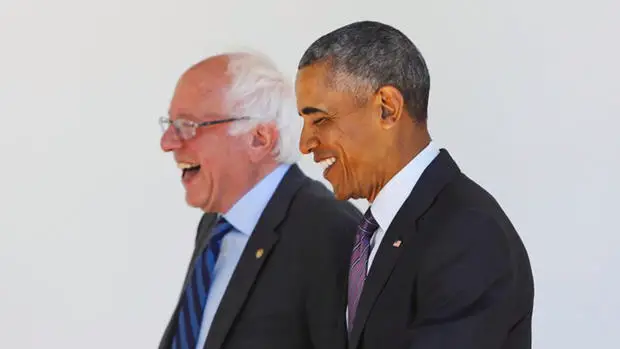Less than an hour after meeting with Bernie Sanders, President Obama officially endorsed Hillary Clinton. That’s not a big surprise. After their 2008 battle, the two of them have worked closely together. And Obama had to appreciate the quick and firm support Hillary gave to him, once Obama grabbed the nomination from her back then.
So the question is, why did Obama wait this long? Politico explains it.
From the start of the 2016 cycle, two things were clear: First, Barack Obama was fully behind Hillary Clinton and more than happy to raise her spirits with cheerful out-of-the-blue phone calls during the primary season’s many low ebbs; and second, that he wasn’t prepared to endorse her publicly until she proved she could win without his help.
The time has now come. In our own pages, “CJ feeny” tamped down the Superdelegate argument with a little math.
The 2383 figure only exists because of the super delegates. if you consider the contest in terms of pledged delegates the winning number would be around 2050. Clinton has won the popular contest, Sanders would need to present a very compelling case for super delegates to back him over the candidate that the public has chosen.
In other words, if we decided to evaporate ALL the Superdelegates, the winning number would be about 2050, not 2383. And without any Superdelegates, Hillary has 2203 pledged delegates to Bernie’s 1828. The only way Bernie could win would be by manipulating the very Superdelegates he has said we should do away with.
Likewise, Hillary has more than three million more popular votes. Yes, Bernie did better in the caucus states, but only a relative handful of people show up for caucuses. In 2008, Real Clear Politics estimated that if you added votes from all of Obama’s caucus wins, his total popular vote would only have increased by about a half-million.
Back to the Politico story. . .
It was a characteristically cool political calculation: Loyalty was a powerful motive to jump sooner, but preserving Obama’s credibility with rebellious progressives was even more important.
“It’s hard to be the president who is elected in the strength of a movement and then throw yourself on the tracks to stop a movement candidate,” said former Obama adviser David Axelrod of his former boss’ strained but cordial relationship with Bernie Sanders.
So where does that leave Bernie? He was smiling, walking with the President after their talk. Yet, he has repeatedly said he will fight on. Some have interpreted that as continuing to call for a contested convention. Others say he just means he will fight for his principles.
RealClearPolitics wonders if he’ll follow Jesse Jackson’s example.
Nearly 30 years ago, Jesse Jackson campaigned all the way to the 1988 Democratic Convention in Atlanta even though he had mathematically lost the nomination fight to then-Massachusetts Gov. Michael Dukakis more than a month earlier. Jackson called his marathon crusade the “endless campaign” and used it to squeeze concessions from Dukakis that gave the civil rights leader, his issues and his followers a larger role in the Democratic nominee’s fall campaign. . .
Sanders and Jackson are kindred spirits and go way back in their friendship. Sanders, then mayor of Burlington, Vt., was one of the few white elected officials to endorse Jackson for president, first in in 1984 and again in 1988. . .
And now Sanders is apparently stealing a page from the Jackson playbook to gain more leverage for his issues. Just as Jackson pushed Dukakis to embrace his priorities in 1988, Sanders is seeking support from Clinton for higher taxes on the wealthy, reductions in defense spending, a clamp-down on Wall Street, campaign funding limits, expansion of safety-net programs such as Social Security, and free college education. . .
[In 1988,] With the Dukakis campaign footing the bill, Jackson energetically barnstormed the country that fall on behalf of his party’s nominee. He kicked it off with a unifying speech at the convention just one day after the peace accord was reached.
Despite Trump’s attempts to woo Bernie’s supporters, they are way too far apart on all the issues. And anger and hurt over the primaries may only cause a brief flirtation with the other “outsider.” Bernie has said many times that he will do everything he can to stop Trump.
There is no question that Hillary is a poor campaigner. She just doesn’t know how to connect with people. But imagine if the country were crisscrossed by Barack Obama, Bill Clinton, AND Bernie Sanders. None of them can connect with people the way Donald Trump does, but all three of them might.
Donate Now to Support Election Central
- Help defend independent journalism
- Directly support this website and our efforts
